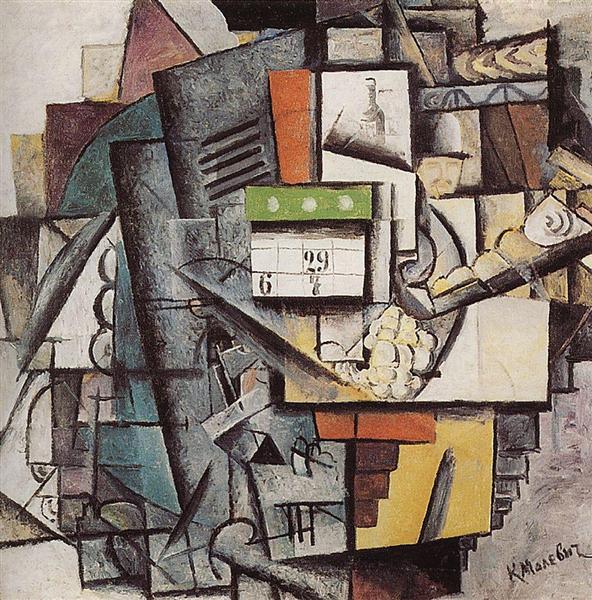Description
The painting "Lady in a tram station" of 1913, created by the famous Russian artist Kazimir Malevich, is an intriguing manifestation of the vibrant and dynamic period that preceded his revolutionary suprematist stage. Malevich, one of the parents of abstract art, in this painting It still shows the influence of previous currents such as Cubism and Futurism, movements that flow in a palpable way in this composition.
When observing the work, we are facing a seemingly daily scene: a woman waits at a tram station. However, Malevich's representation is far from the simple recreation of observable reality. The woman, central in the composition, is represented through an amalgam of geometric shapes and bright colors that fragment and deconstruct their figure and the environment. This not only reflects the influence of Cubism, which seeks to decompose objects and people in its most basic ways to offer multiple perspectives simultaneously, but also the dynamism of futurism that celebrates the speed and movement of modern life.
The color palette, prevailed by primary tones of red, blue and yellow, together with black and white, adds a vibrant energy to the whole. These colors are distributed in angular and fragmented patterns that confer to the scene a sensation of rhythm and movement, aligned with the frantic life of the cities in the advanced industrial era. We cannot identify precise details of the lady's face or clothing, as Malevich does not seek reliable representation but the evocation of a universal experience of modernity.
The background of the paint is also broken into geometric shapes, vaguely suggesting the infrastructure of a tram station, but without allowing the viewer to abandon the easy identification of recognizable elements. Everything in the work is oriented to the evocation of sensations, to the active participation of the observer in the reconstruction of the moment and space represented.
Malevich, at the time of creating this work, was exploring intensely different influences and artistic approaches, moving towards its development of suprematism, a movement that emphasizes the supremacy of pure artistic sensibility above external representation. "Lady at a tram station" is located right at this turning point, where forms still have anchors in observable reality, but they begin to free up towards complete abstraction.
Comparing this work with other contemporaries of his, such as Marcel Duchamp and his "nudes lowering a ladder" or the compositions of Giacomo Balla, this intention to capture the moment of transition, the flow of modern life and speed can be clearly appreciated of the technological and social advances that characterized the early twentieth century.
In summary, "Lady at a tram station" is a fascinating testimony of the artistic transition of Kazimir Malevich and the vibrant visual speech of the time. It is a work that, through its geometric and chromatic language, invites the viewer to participate in a meditation on modernity, change and nature of artistic representation.
KUADROS ©, a famous paint on your wall.
Hand-made oil painting reproductions, with the quality of professional artists and the distinctive seal of KUADROS ©.
Art reproduction service with satisfaction guarantee. If you are not completely satisfied with the replica of your painting, we refund your money 100%.

